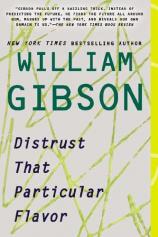Distrust That Particular Flavor
Review
Distrust That Particular Flavor
He is credited with coining the term “cyberspace” and has written novels like NEUROMANCER and MONA LISA OVERDRIVE that have given us a glimpse of a frequently unsettling future. Now, in DISTRUST THAT PARTICULAR FLAVOR, William Gibson offers his first nonfiction collection, an assortment of 25 often quirky pieces, ranging from articles for magazines like Wired, Fortune and Time, to essays, book introductions and speeches. Witty, insightful and refreshingly self-deprecating, they reveal that Gibson is as talented in reflecting on our own time as he is in envisioning our collective future.
"Witty, insightful and refreshingly self-deprecating, [these pieces] reveal that Gibson is as talented in reflecting on our own time as he is in envisioning our collective future."
Perhaps that ability flows from his grasp of one of the recurring tropes that appear in these pieces. “All cultural change is essentially technologically driven,” Gibson believes, a point he illustrates in “Googling the Cyborg,” a speech delivered to the Vancouver Institute in 2006. In it, he describes what he calls the “Steam Engine Moment,” a recognition that certain ideas have been around for a long time, but only blossom when they’re destined to do so. He’s less interested in the construction of physical robots as he is in the way our interactions with electronic media are creating what he calls an “Augmented Reality,” offering us something approaching the universal library imagined by one of his literary heroes, Jose Luis Borges, for whose LABYRINTHS he contributed a preface that appears here (“A ridiculously unearned honor, to be asked to do this. I’m still embarrassed.”).
Of writing about the future, Gibson told an audience at BookExpo America in 2010 that “imaginary futures are always, regardless of what the authors might think, about the day in which they’re written.” That’s as true of George Orwell’s NINETEEN EIGHTY-FOUR, he argues, as it is of Gibson’s own novel, NEUROMANCER, set in the 2030s, and published in the same year as Orwell’s nightmare vision. He makes a similar point in an essay on H.G. Wells and his story, THE TIME MACHINE.
“Time moves in one direction, memory in another,” Gibson observes of another one of his fascinations --- the notion, reflected as long ago as the time of the ancient cave painters, that ours is “that strange species that constructs artifacts to counter the natural flow of forgetting.” In more than one piece, he notes, with an almost childlike awe, that we can turn on the radio or television and summon dead people back to life.
Gibson’s travel pieces, revealing him as something of an idiosyncratic travel writer, are among the most entertaining ones here. “Disneyland with the Death Penalty” is his portrait of 1993-vintage Singapore, a “relentlessly G-rated experience, micromanaged by a state that has the look and feel of a very large corporation,” and a place where economists can be tried for revealing the country’s growth rate or a man sentenced to death for importing one kilogram of marijuana. He has a special affinity for Japan, the setting for some of his fiction, and a country he describes as “the global imagination’s default setting for the future,” even after the bursting of its economic bubble.
Although Gibson’s writing doesn’t typically veer too far into the personal, there’s an amusing, if overlong, article for Wired, “My Obsession,” recounting his fascination with bidding on mechanical watches on eBay. He also confesses his love of the music of Steely Dan (“Any ‘Mount of World”), describes an abiding affection for the city of London (“Metrophagy”) and confesses, most shockingly, in “The Net is a Waste of Time,” that at least as of 1996 he didn’t use email (“In all truth, I have avoided it because am lazy and enjoy staring blankly into space…and because unanswered mail, e- or otherwise, is a source of discomfort.”).
Gibson is nothing if not humble, as he reveals in an Introduction that explains how he came to the writing vocation. Admitting he’s not entirely comfortable making the transition from fiction to nonfiction, he concedes he has “often felt as though I’m applying latex paint to the living room walls with a toothbrush.” One especially enjoyable feature of the collection are the comments, ranging from a sentence or two to a few paragraphs, that Gibson appends to each of the pieces, reflecting on their provenance or the circumstances of their creation.
William Gibson doesn’t reveal any preternatural gift here for gazing into the distant future with startling clarity. Instead, he has been blessed with an even more valuable talent: the ability to keenly observe the present and show us how the changes it’s already spawning someday will insinuate themselves into our lives.
Reviewed by Harvey Freedenberg on January 5, 2012
Distrust That Particular Flavor
- Publication Date: September 4, 2012
- Genres: Essays, Nonfiction, Popular Culture
- Paperback: 272 pages
- Publisher: Berkley Trade
- ISBN-10: 042525299X
- ISBN-13: 9780425252994





